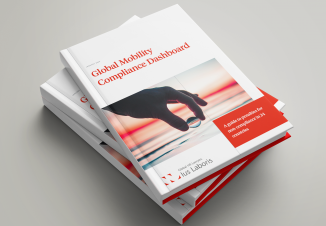
Kazakhstan joined the World Trade Organization (‘WTO’) in 2015. Acceding to the WTO Treaty paved the way for foreign employees to work in Kazakhstan using intra-corporate transfers, however, the practical implementation of Kazakhstan’s treaty obligations is complicated.
What is an intra-corporate transfer (‘ICT’)?
An ICT is the temporary transfer of an employee where:
This definition is used in the 2016 Kazakhstan Employment Law and 2011 Migration Law. It is also used in regulations relating to foreign labour permits and foreign labour quotas (the ‘Permit Issuance Rules’ and the ‘Foreign Labour Quota Rules’ respectively).
International basis for intra-corporate transfer
Provision is made for ICT in Kazakhstan under the terms of its WTO accession arrangements through GATS the ‘GATS Schedule’ and under treaties with the European Union in 2015 and the Republic of Korea in 2014.
Kazakhstan’s WTO treaty obligations were implemented into Kazakh law in October 2015, but the country’s new Labour Code was adopted one month later with no provisions regarding ICT. The adoption of a new Employment Law in 2016 did not rectify this. Though Kazakh law now provides for ICT, there is no consistent legislative framework. This gives rise to multiple difficult issues on which complex interpretation of existing law is required.
| Criterion | Permitted | Not permitted |
|---|---|---|
| Sending organisation (foreign employer) | A legal entity organised in the territory of a WTO member state located and operating outside Kazakhstan. | Legal entities registered in Kazakhstan; Branches and representative offices of the sending organisation registered in Kazakhstan; Legal entities organised outside a WTO member state. |
| Host organisation in Kazakhstan | A branch, representative office or subsidiary of the sending organisation in Kazakhstan. | Another person, including members of the sending organisation's group of companies, but not a branch, representative office or subsidiary. |
| Transferring employee's citizenship | Foreign citizen or stateless person. | A Kazakhstan citizen permanently residing outside Kazakhstan. |
| Transferring employee's position in the sending organisation | An executive, manager or specialist (as defined in the Permit Issuance Rules). | A foreigner who does not have an employment relationship with the sending organisation (e.g. working under a civil law contract or seconded to the sending organisation from another company). |
| Work experience | The transferring employee must possess at least 1 year’s employment experience at a legal entity in a WTO member state located and operating outside Kazakhstan. | Work experience at other legal entities organised and operating outside the WTO member states. |
| Sector of economy | A sector mentioned in Annex 1 to the Foreign Labour Quota Rules. | A sector not mentioned in Annex 1 to the Foreign Labour Quota Rules. |
| Term of ICT | Temporary, for not more than 3 years extendable by 1 year. The term is determined by the employment agreement. | ICT for an indefinite term (for permanent work). |
What are the main advantages of intra-corporate transfers?
Although ICT requires the host organisation to obtain a work permit, it can be obtained free of charge and without triggering foreign labor quota limits.
Moreover, in an ICT context, the minimum threshold of local staff for host organisations is less (50% for all categories of employee) than in non-ICT scenarios (commonly 70% or 90% depending on the employee category). Where the ICT is for executives, no conditions apply.
The GATS Schedule and Permit Issuance Rules do however impose a transitional economic needs test where the ICT is for managers and specialists (in force until 1 January 2021) and a special obligation to develop a local labour force.
What law governs the employment relationship?
Kazakh labour law applies to the employment relationship. Whilst this not explicit in the legislation, there is no statement that Kazakh labour law does not apply and the provisions that could be considered to deal with the topic support this interpretation.
The 2015 Labour Code (the ‘Labour Code’) governs employment relationships in Kazakhstan. Confusingly, the Labour Code is silent on whether, in an ICT context, the employer is the sending organisation, the host organisation, or both. The best interpretation of the law is that the Labour Code applies in its entirety, and that the host organisation is the employer for Labour Code purposes.
The status of host organisations that are branches or representative offices and those that are subsidiaries differs under the local law, but the Labour Code applies to both categories. A subsidiary is a legal entity based in Kazakhstan, so the Labour Code applies automatically. For branches and representative offices, the Labour Code expressly extends its application to branches and representative offices of foreign legal entities which have completed the necessary registration process.
Provisions of the Labour Code relating to the start of employment also support the ‘labour relations’ concept between the host organisation and transferring employees.
Further, the Migration Law and Employment Law expressly state that transferring employees carry out labour activities in Kazakhstan and the host organization is called an ’employer’. The GATS Schedule also appears to support the application of the Labour Code. Whilst the definition of ICT differs from that under domestic law, the effect is that transferring employees become the host organisation’s employees and are subject to all entry, stay and work requirements under Kazakh law.
Confusion arises under the Permit Issuance Rules, which imply that no ‘labour relations’ arise under Kazakh law, and that the Labour Code only applies to a limited extent. However, as a matter of statutory interpretation, the Labour Code prevails over the Permit Issuance Rules.
Practical issues relating to the employment agreement with the transferring employee
Even though Kazakh labour law applies to ICT, the Permit Issuance Rules state that the employment relationship is regulated by the employment agreement (or equivalent document) agreed between the transferring employee and the sending organisation.
Based on this, the Ministry of Labour and Social Protection (the ‘Ministry of Labour’) declares that there is no need for a new Kazakh employment agreement with the host organisation. This contradicts the analysis in the previous section suggesting that the employer is actually the host organisation.
Moreover, the Permit Issuance Rules allow the employment relationship to be governed by the employment agreement or by another other document. This contradicts the Employment Law and Migration Law where the term of ICT is determined by the employment agreement only.
Do Kazakh legal requirements about working time, rest and occupational safety apply?
Under the Permit Issuance Rules, the host organisation’s working time, rest regime and occupational safety requirements apply to the transferring employee falls for the period of ICT. This means that the transferring employee will be covered by benefits and requirements in these areas (e.g. limitations on overtime, days on rotation, holidays and days off).
Do other aspects of Kazakh labour law apply to ICT?
According to the Ministry of Labour, Kazakh labour law applies to any aspect of labour law not governed by the employment agreement (or other document). This is at odds with the Ministry’s opinion that a new Kazakh employment agreement is not required, because Kazakh labour law requires that an employment agreement conforming to Kazakh labour law is in place.
The authors recommend that the employment agreement between the transferring employee and the sending organisation be as detailed as possible to avoid dispute, with explicit provisions relating to working time, rest, occupational safety and other applicable benefits and obligations (which conform to Kazakh labour law).
| Subject | Law |
|---|---|
| For what period can the transferring employee be sent on business trips? | 90 calendar days, in aggregate, over one calendar year (for business trips within Kazakhstan). Business trips outside Kazakhstan are not limited by any period. |
| Where can the transferring employee be sent to on a business trip? | To any enterprise, organisation located in Kazakhstan outside the territory for which a transferring employee’s work permit has been issued. Business trips outside Kazakhstan are not limited. |
| By whom can the transferring employee be sent on a business trip? | By an employer, though this is one situation in which there might be difficulties of interpretation if is not clear whether the employer is the sending organisation or the host organisation. |
Specific issues relating to the Korea Treaty
The Korea Treaty provides for ICT to affiliates as well as subsidiaries, branches and representative offices. Under the Korea Treaty ‘temporary labour activities of the citizens of the sending country in the territory of the host country shall be governed by the relevant national legislation’. The Treaty does not specify to which national legislation (Kazakhstan’s or Korea’s) this refers.
However, the Korea Treaty states that if the transferring employee breaches a law of the host country, the employment agreement is terminated and the transferring employee is returned to the sending country. This obviously implies that the transferring employee enters into an employment agreement with the host organisation.
Despite this, the Ministry of Labour’s official clarifications states that if the sending organisation is a Korean company, Korean law governs the relationship and no employment agreement is required for Kazakhstan.
What are the risks of ICT?
There are risks for each of the parties involved in an ICT.
For the sending organisation:
For the host organization (which is a subsidiary):
The ambiguous legal status of transferring employees and the lack of clarity regarding the applicable law for different employment issues means both sending and host organisations run the risk of disputes with the transferring employees and government agencies.
For transferring employees, it is not clear what effect this will have on their relationship with the sending organisation and their entitlements in their home and host countries may be affected.
Conclusion
The best interpretation of the legislative situation overall is that Kazakh labour law applies to ICT and that the parties to the employment relationship are the host organisation and the transferring employee, but that the existing employment agreement applies, (with any necessary adjustments to conform with Kazakh labour law).
However, based on the Permit Issuance Rules, government agencies consider that there are no ‘labour relations’ between the host organisation and the transferring employee. The Kazakhstani courts are not bound by this opinion. Potentially, this exposes host organisations to disputes if things go wrong during the ICT, for example, personal injury, disciplinary matters or dismissal. There are also risks for the sending organisation and the transferring employee.
The Permit Issuance Rules attempt to regulate some of these matters, but they contradict the primary legislation. This contradiction can only be resolved by new legislation. While ICT may be an appealing option for attracting talent to Kazakh organisations, there are risks that require careful handling by all the parties involved. The law requires further clarification and host organisations would be well-placed to encourage government action to achieve this.


